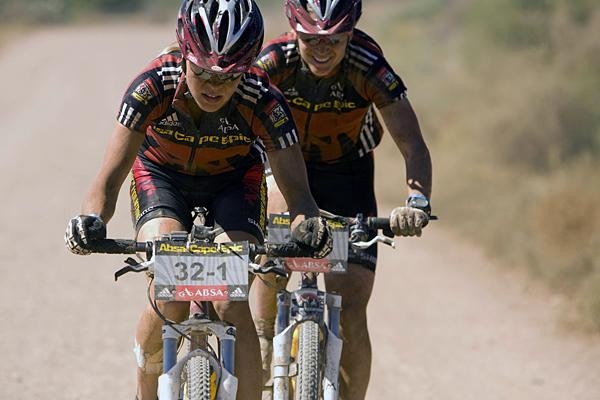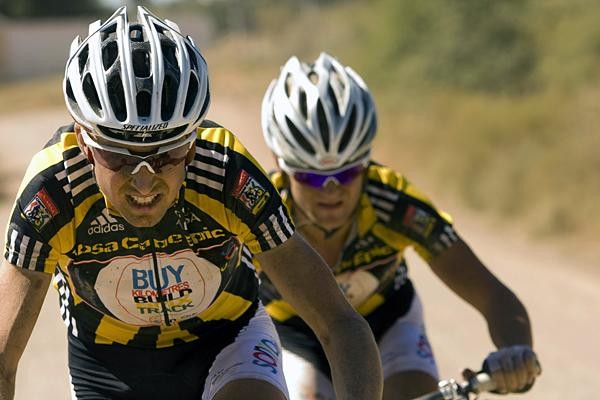A day in the life of an Epic rider
For backmarkers it can be hard enough to make the 10-hour cut-off each day. The weather is...


MTB News Feature, April 5, 2008
So just what does it take to stay on the bike and in the Absa Cape Epic for its nine arduous days? Well, the answer varies considerably depending who you ask. And after which stage… During his time in South Africa, Cyclingnews' Nic Lamond answers that question for the average amateur and the pro riders.
For backmarkers it can be hard enough to make the 10-hour cut-off each day. The weather is unbearably hot - peaking at 39 degrees Celsius as riders traversed South Africa's inland Karoo desert region a few days ago. The terrain is unforgiving and lies waiting to slash tyre sidewalls or destroy derailleurs in a heartbeat. And mechanical wear-and-tear routinely shatters the ambitions of riders of even the most meticulously maintained bikes. But it doesn't end there.
If riders manage to negotiate the demanding course within the cut-off time a manic scramble awaits their arrival at the overnight stop. Bikes need to be cleaned, repaired and finally lubed in preparation for the next day's battle with the elements. Riders also need to find their kit bags that have been transported en masse from the previous stage finish. Securing one of the 1,200 tents erected overnight is their next task - preferably one close to the showers and a short walk from the dinner marquee, but not too close to the rows of portable toilets whose plastic doors bang incessantly throughout the night. If you arrive late you can guaranteed your much needed sleep will be in a tent with front row access to the all-night toilet door recital.
For those who think ahead, or arrive early, teams of physiotherapists will gladly soften aching muscles, but for those most in need getting the bike ready to roll off the start line in the morning takes precedence and the body must wait till bed time to get its only reprieve of the day.
Then it's dinner time. At 6:00 pm the huge white tent fills with riders and press as teams of chefs serve up a carbohydrate feast for all participants. The daily prize-giving kicks off with its cheesy soundtrack and then the virtual fly-through of the following day's trail follows.
If serious bike repairs are needed - and the riders' race planning didn't include hiring a personal mechanic - riders often remain tinkering with their machines well past midnight.
Get The Leadout Newsletter
The latest race content, interviews, features, reviews and expert buying guides, direct to your inbox!
At 5:00 am a foghorn wakes the sleeping masses and the riders need to eat, collect their bikes and pack everything up before the start gun is fired at 7:00 am. Not surprisingly the campsite in the half light of the morning looks more like a graveyard meeting for zombies than the athletes' village it claims to be.
But for the few international pro teams and those lucky enough to have the backing of a corporate sponsor, it is a different game altogether. Burry Stander, the younger half of Team Songo.info and until the team had to withdraw, said, "The team is very professional, and the mechanics… you don't even think about the bikes. Everything is taken care of: massage, food, all those things. Especially on a multi-day race like this you have to look ahead at the following day and the day on top of that. That's very different to a one-day cross-country race where you don't have to think about recovery and that. You ride and you're done."
Stander and team-mate Christoph Sauser were at one point leading this year's Cape Epic. Unfortunately, the South African succumbed to a knee strain and had pull out on only day three of eight, leaving Sauser to abandon the race, too.
But in his short stay at Christoph's side Burry was exposed to a level of professionalism he would not have known in South Africa.
Alison Sydor, Canadian mountain biking legend and holder of the women's leaders' jersey with team-mate Pia Sundstedt after several scorching days in the saddle, is being cared for by the South African Rocky Mountain distributor, and appreciates everything that is done to keep her almost entirely focussed on riding. "I imagine staying in the motorhome we have is a lot easier and more comfortable than staying in the tents, although I have to say the climate is just perfect for it here!"
"But sleep in? Are you kidding?" Sydor blurts out, quick to dispel the myth that pro riders are waited on hand and foot as they ride into one the overnight stops. "We are up at 5:00 am and try to get to the dining hall for breakfast. But I don't want to stand in another line, so I have coffee from home in a French press. It's a little bit more of a relaxed morning, but Rocky Mountain are really looking after us."
That said Sydor still finds it tough to fit in all the morning's preparations ahead of the 7:00 am start. It seems there's not much time in the morning, no matter who you are.